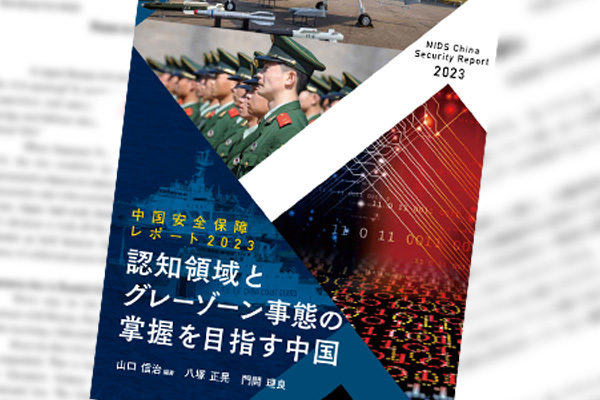On November 25, the National Institute for Defense Studies (NIDS), a think tank for the Ministry of Defense, published “China Security Report 2023.” On November 29, the U.S. Department of Defense released an annual report on China’s military power. The two reports agree that China has enhanced its challenge to the U.S.-led international order.
While the U.S. report puts emphasis on China’s nuclear and other military strategies, the Japanese report focuses on issues directly related to Japan’s security as indicated by its subtitle “China's Quest for Control of the Cognitive Domain and Gray Zone Situations.” I here would like to discuss challenges facing Japan, centering on the NIDS report.
China’s influence operations and gray zone situations
At the Chinese Communist Party’s Congress in October, General Secretary and President Xi Jinping said of Taiwan, “We will continue to strive for peaceful reunification with the greatest sincerity and the utmost effort, but we will never promise to renounce the use of force, and we reserve the option of taking all measures necessary.” As part of “all measures necessary,” the NIDS report describes strengthening of non-miliary means, influence operations and gray zone situations.
China is a country of Sun Tzu’s Art of War that gives top priority to “winning without fighting.” The game may end when Taiwanese people judge that it is no use fighting a loose battle. This represents “cognitive warfare.” In this regard, various influence operations are going on, as described along with specific cases in the NIDS report. These operations include propaganda, so-called three warfares (public opinion warfare, psychological warfare and legal warfare), united front work (creating rifts in adversary parties and gaining friendly allies), social media campaigns, cyber warfare and direct approaches to business corporations and military service members. In recent local elections in Taiwan where the ruling Democratic Progressive Party suffered a crushing defeat, China might have conducted these influence operations. As a matter of course, we must assume that such operations are going on in Japan’s political and business world, too.
Maritime militia and China Coast Guard (CCG) operations described in a chapter on China’s maritime gray zone situations are particularly serious for Japan. Organized into the maritime militia are people who usually engage in fishing. Under the direct command of the Communist Party’s Central Military Commission, the CCG with advanced equipment and enhanced authorities and the organized maritime militia assert maritime rights and interests. The maritime militia undertakes “a wide range of paramilitary activities that could escalate a crisis if undertaken by the military, are too costly for law enforcement agencies to carry out, and are difficult for ordinary fishermen to perform due to equipment, management, and other requirements.”
Japan defeated without fighting
In case of Japan, the Japan Coast Guard (JCC) with police authority alone cannot compete with the CCG authorized to use military force. The JCC can do nothing against the maritime militia comprising a great number of militiamen. In this way, Japan is defeated without fighting in maritime gray zone situations.
It goes without saying that Japan must prepare for a Taiwan contingency as it would amount to a Japan contingency. But Japan should prepare not only for a “visible contingency.” A “quiet contingency” has already begun in the form of cognitive warfare, influence operations and gray zone situations. Japan is urgently required to recognize this and appropriately respond.
Kunio Orita is a member of the JINF Planning Committee and a special professor at Reitaku University. He is a retired Lieutenant General of the Japan Air Self-Defense Force.


